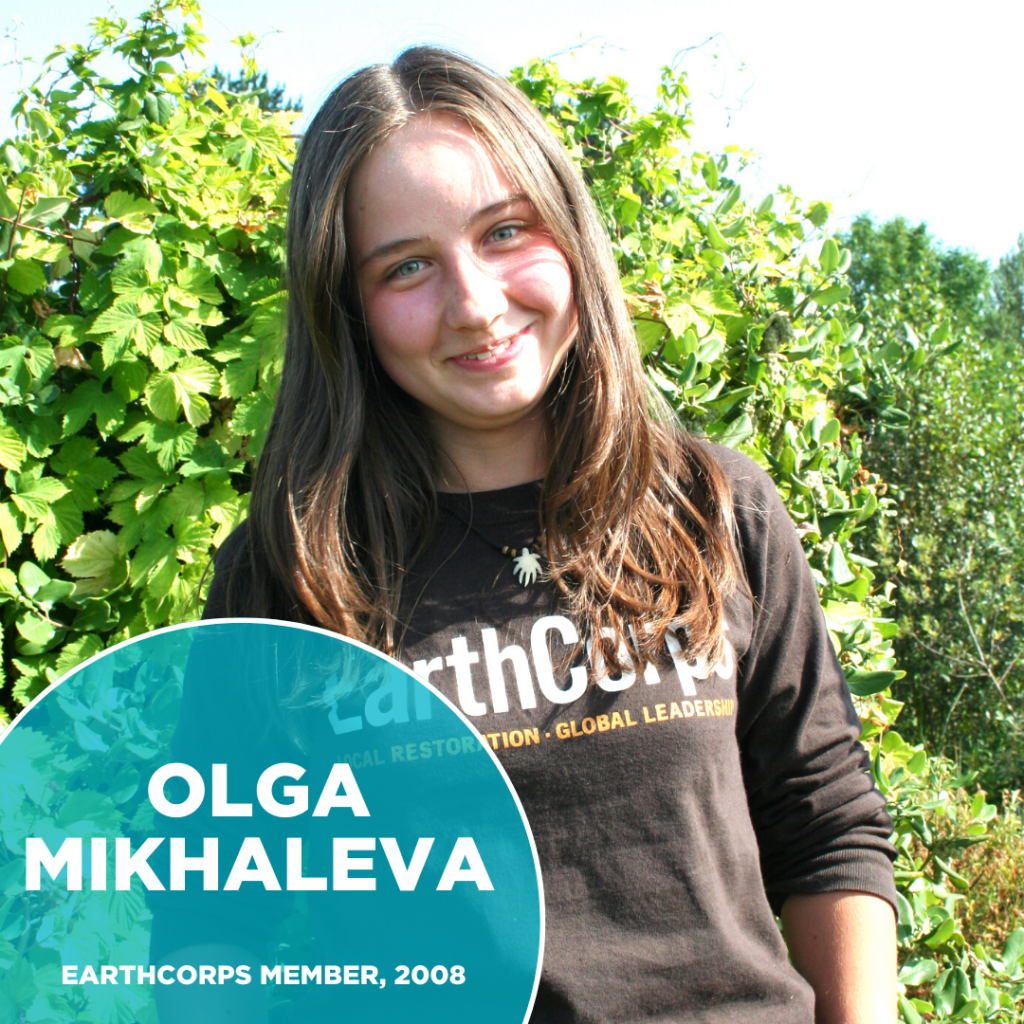Olga Mikhaleva: A Journey of Self-Discovery

Olga Mikhaleva was an EarthCorps member in 2008. Her home organization was and still is Great Baikal Trail. She started as a seasonal field leader for GBT leading summer expeditions for many years, now she is the Environmental Education Program Coordinator. Over the years, she has been developing her expertise in environmental education including a Master’s Degree in Environmental Studies. Her research included several expeditions in highly protected conservation areas in the Baikal Region. In addition, Olga spent 10 months at an environmental research center in Portugal and has been an environmental exchange volunteer with the Tahoe-Baikal Institute.
A small organization in a vast country has a big goal: create a connected system of trails around the world’s largest freshwater lake. In the mountainous region of Siberia, Lake Baikal spans 400 miles, reaches 5,000 feet deep, and holds 20% of the world’s freshwater. The expansive lake freezes with a crystal clear, thick layer of ice in the winter, and is surrounded by wildflowers in the summer. It’s no surprise that this natural wonder is a growing tourist destination.
More visitors mean more feet trampling native plants and more degraded land.
The nonprofit Great Baikal Trail (GBT) saw an opportunity – the lake needs sustainable and well-maintained trails so visitors can experience the beauty of the lake while leaving little impact on the land. They took a unique angle to achieve this goal– invite visitors to help build the trail. GBT leads week-long volunteer opportunities for people from around the world to help build the Great Baikal Trail.
Olga Mikhaleva signed up for one of those week-long volunteer experience and fell in love with the lake, the work, and the ability to give back to nature. She was studying linguistics at a university but wasn’t sure what direction she wanted to take her career. She enjoyed building trails and connecting with other volunteers, so she spent the rest of her college summers volunteering with GBT.
A colleague at GBT encouraged Olga that if she really liked trail building and restoration, she should go to Seattle and participate in EarthCorps. In 2008 Olga took the opportunity to join EarthCorps as an international corps member to learn more about trail building, environmental restoration, teambuilding, and leadership.
She came to EarthCorps expecting to gain technical skills but was transformed by the people she met.
“My experience at EarthCorps was really, really important for me. The positive attitude and appreciation, even by people on the bus. They’d see our dirty pants and say ‘Thank you for your hard work.’ Wow! You would never feel this back home, and it gave me the power to keep doing this work.”
Olga’s crew leader taught her how to motivate people, manage conflict, listen, and work together – all skills that she took and implemented back home leading volunteers at Great Baikal Trail.
One of the most influential parts of her EarthCorps experience was living with a homestay family. She learned about America from the inside – not from the media, but from a family. She learned about what they really care about, and how they relate to one another and to the greater world. To her, living with a homestay meant building bridges between cultures and countries.
“Living in Siberia and not having ever left that place before, I didn’t know much about life. For me, EarthCorps was a big thing, and it still is.”
EarthCorps changed Olga’s career path. She returned home to Russia and pursued a Master’s degree in environmental studies and bird monitoring. She implemented all she learned at EarthCorps and her master’s degree to help advance Great Bikal Trail’s mission where she worked as the Environmental Education Program Coordinator.
Olga was fascinated by various field guides in the Pacific Northwest that depicted our native birds and plants. She kept looking for a book of native birds to Siberia and the Lake Baikal region. After years of not finding what she was looking for, she decided to create her own. Now visitors to Lake Baikal can use her bird guide to identify and appreciate the birds they see!

